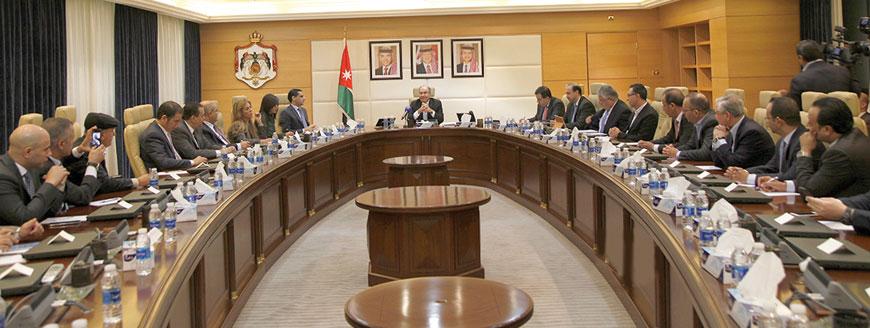You are here
Self-reliance is the only option in the coming stage — PM
By Mohammad Ghazal - Oct 23,2017 - Last updated at Oct 23,2017

Prime Minister Hani Mulki meets with media personnel in Amman on Sunday (Petra photo)
AMMAN — The government will go ahead with reforming the sales tax and cash support will be given to citizens entitled to receiving the subsidies, Prime Minister Hani Mulki said on Sunday.
"Many of the sales tax exemptions did not reflect on the targeted segments that are entitled to the subsidies and the desired objectives for such exemptions were not realised," the premier said at a meeting with media leaders and representatives from the sector.
On possible removal of the subsidy on bread, he said decision has not been taken yet on whether to remove or keep bread support, estimated at JD145 million a year.
“We are still looking into this issue, but there is no country in the world that subsidises bread like Jordan… In Lebanon, for example a kilo of bread is sold for $1,” he said.
“We do not want to remove subsidies but we want to address the waste in subsidies as non-Jordanians also benefit from the support,” Mulki added.
To reduce the impact of restructuring sales tax on citizens, the 2018 state budget will include an item that entails allocations for the social safety net to help Jordanians in need.
“The volume of allocation will be decided following discussions with the Lower House and the amounts will support certain segments of the society that are classified as in need of support… if unemployment rises, the allocations will increase and if it declines, the size of support will, for example,” Mulki explained.
The premier noted that government subsidies of electricity, water, bread, cooking gas, foodstuff, medical care and others will amount to about JD850 million in 2017.
He said he was aware that the situation was “delicate”, adding that it was essential to start addressing challegnes facing Jordan immediately.
On economic development, Mulki said there has been an increase in the volume of investments coming into the country as well as tourism revenues and exports.
He added that the government would be able to keep public debt as a percentage of gross domestic product stable at the end of this year at around 95 per cent.
“We are fully aware that there are burdens on citizens and that there is suffering but if we do not implement fiscal reforms, there will be other undesirable reforms we will have to achieve,” said Mulki.
Referring to grants, he said: “There is a very modest level of grants and it is well below what was predicted in the state budget… [Therefore] self-reliance is our objective,” he added.
“We have a national agenda and programme to address the issues we face and now have a golden opportunity to do that,” said Mulki.
The prime minister added that the new measures would be part of a comprehensive process entailing administrative, economic, development and political reforms.
“We need to have reforms at all fronts to ensure better outcomes and the government will not postpone addressing the problems ,as that is a big mistake, and if we do not address the problems we face now the cost for addressing them later will be higher,” said Mulki.
“We have to rely on ourselves as donor countries have made it clear that they cannot help us if we do not take measures to help ourselves,” Mulki added.
To address unemployment, especially among women where the rate is around 33 per cent, he said the government was working on a JD100 million project to create new jobs for Jordanians. Projects were also under way to enhance the skills of Jordanians in various areas.
Fiscal reforms will also go hand in hand with providing incentives to investments, he said, adding that such an approach was crucial for driving economic growth and jobs, Mulki said, adding that the government has allocated JD1.2 billion to drive growth in the services sector and JD224 million for the construction sector in addition to several other projects.
For the health sector, the government earmarked JD98 million and JD35 million for the energy sector.
Mulki added that the government opened the door for the private sector to participate in the implementation of 23 projects including desalination projects in Aqaba and solar energy projects among others in fields of transportation and infrastructure.
Reforming the public sector will be among the top priorities, he said, adding that protecting the sector’s image and reputation is key and, accordingly, measures will be taken to enhance accountability and monitoring.
Acknowledging a decline in the quality of education at all levels, the premier said Jordan cannot but go ahead with reforming the sector to address loopholes.
“Our methods still date back to 30 years ago and education is developing while we are remaining in our place. No matter how costly they are, measures will be taken to address the issue as education is key for the distinction of Jordanian human resources.”
Related Articles
AMMAN — Prime Minister Hani Mulki on Friday stressed the twin local elections held on Tuesday represent a milestone in the comprehensive ref
AMMAN — Lower House Speaker Atef Tarawneh on Thursday headed a meeting of the house's finance committee with Prime Minister Hani Mulki, the
AMMAN — Prime Minister Hani Mulki on Tuesday said that 5,125,000 Jordanians will benefit from government financial support after the removal



















